At WIE Orientation, Engineering Freshman Women Experience Campus, Build Community
September 13, 2016
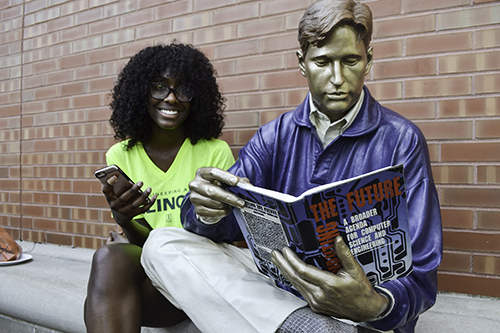
An Engineering freshman poses by Grainger Bob during WIE Orientation's scavenger hunt.
The week before classes began for the Fall 2016 Semester, 251 Engineering freshman women sacrificed their last week of summer vacation to attend Women in Engineering (WIE) Orientation on August 16–18. These future engineers showed up early hoping to get a jump start on the fall semester…and they did. They got familiar with campus, learned about some support systems available to them, and built community—with staff and students in their own departments, with Engineering staff who hope to see them succeed, and with older female Engineering students on hand to show them the ropes.
What was new and different at this year’s Freshman Orientation? The number of students…not at WIE Orientation itself (those numbers were similar to last year’s)—but the number of female students in this year’s Engineering freshman class: “This Orientation represents a class of freshmen women that’s 25% of the freshman class,” says Sue Larson, Associate Dean and WIE Director. “I guess that’s part of what’s new and different.”
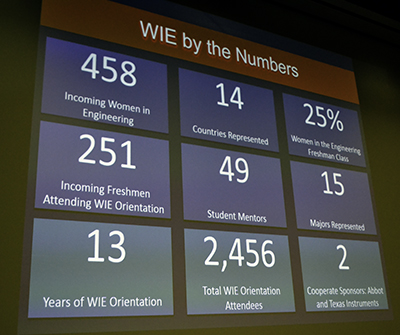
This slide showing the strides the College has made in terms of recruiting women engineering students garnered a huge round of applause during WIE Orientation's opening session.
So our numbers are up!” exclaims Angie Wolters, WIE Assistant Director. There were huge smiles all around the table during the last planning session prior to Orientation, as these women—all so passionate about engineering...and increasing the number of women in engineering—celebrated this milestone in Engineering at Illinois. An even bigger celebration ensued when members of the biggest-ever freshman class of women in Engineering saw the numbers during Orientation’s welcome session. (In fact, because of the bumper crop of incoming freshman women, those who could go to another new-student orientation besides WIE’s were encouraged to do so in order to make WIE’s numbers more manageable—something that would have been unheard of a few years ago.)
With the excitement of rising numbers came the negative side effect: rising costs. But stepping up to help were two corporate sponsors: Texas Instruments and Abbott, employer for Cindy Richartz, who, along with her daughter, Stephanie, served as WIE's keynote speakers. The mother-daughter team represented two generations who had studied industrial engineering at Illinois, Cindy shared her experience as a woman in engineering, while Stephanie shared that she had successfully made it through some early struggles to graduate and successfully land a job, and they could too.
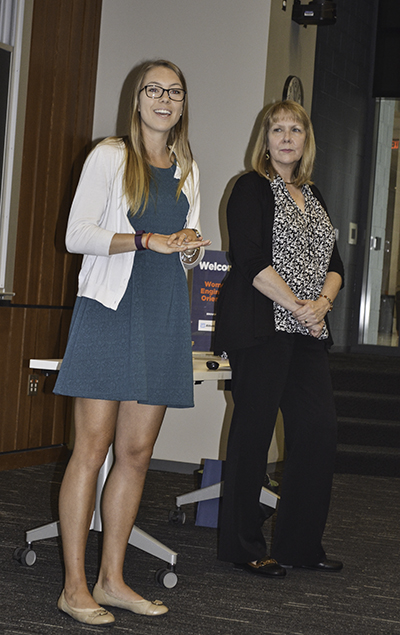
Left to right: Stephanie and Cindy Richarts share about their experiences in Engineering.
One objective of Orientation was to connect girls with folks in their departments—including other freshmen—so they might see a familiar face the first day of class. So girls were grouped by department, older students in their departments served as mentors, and they met departmental personnel, including their advisors, during a luncheon held at their departments.
While all of Orientation’s events were fun, they intentionally had multiple objectives. Yes, one object of the Amazing Race scavenger hunt, besides fun, was for freshmen to get familiar with campus so they wouldn’t be totally lost their first day of classes. But freshmen also built relationships with each other and their mentors, plus visited places that will be important over the next four years: their department’s office, plus Engineering’s Advising, Career Services, and Undergraduate Offices. Planners particularly wanted to emphasize CARE (the Center for Academic Resources and Engineering), Engineering’s peer advising and tutoring center.
“The cool thing about the scavenger hunt,” explains Wolters, “when they’re going through, and they’re visiting these spots, and they’re doing their team activity at them, they’re grabbing clues that they’re going to use to do their build activity.” Wolters was referring to the Lego Build project, the final activity of the Amazing Race, intentionally scheduled at CARE to expose the freshmen to the space on the 4th floor of Grainger Library.
“That’s where they’re going to be doing their studying,” adds Larson. “There’s resources there. If you have questions, there are group study rooms. There are tutors available. That’s the place to go for studying.”
The whole space at CARE is dedicated to engineering students. In addition to work stations, open tables, and individual study carrels, there are study rooms where groups of students can plug in a computer, project the image on a big screen, and work together on homework. “So we are going to send them to that space to do a build,” Wolters explains, “essentially having them go their first time and see how they can use this space to collaborate with one another because that’s the intent of the space for them as students.”
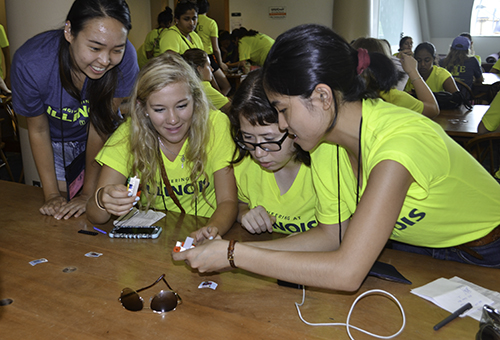
A team of freshmen and their mentor do the Lego Build activity at CARE in Grainger LIbrary.
When planning Orientation, engineering seniors Rebecca Ficht, Lara Flasch, and Liz Gacek, the student coordinators, made sure the freshmen were exposed to things that might be new and, thus, possibly confusing to them. So most of the events, particularly the Day 3 workshops, exposed freshmen to new things they would encounter or should be aware of. For instance, as its name implies, during “All Things Google,” the veterans taught the rookies about their Illinois Google email account, drive, and calendar.
Also, it was even easier for freshmen to stay in contact with their mentors due to a step up from just Facebook—GroupMe, some new technology for this year. Wolters says that before the week even started, mentors had already reached out individually to the girls, shared numbers, and created GroupMe’s.
“We know that when we’ve created this much support, and in using social media as a way to get them connected before they come, we know it’s a system that ends up lasting throughout the semester…and throughout the years.”
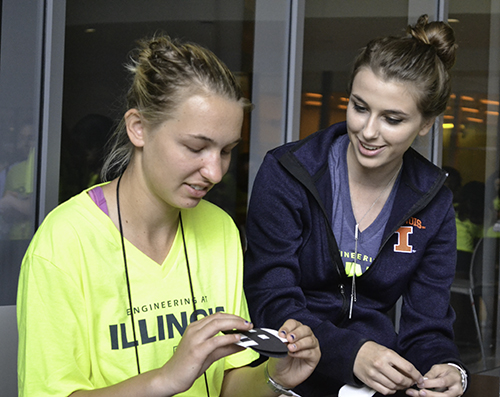
Left to right: An Engineering freshman and her mentor do an activity during WIE Orientation.
Something new students with classes at opposite ends of campus would definitely need to learn about was the C-U MTD. Says Larson: “I think the coordinators have done a great job of determining what’s new to students when they come here. The bus system is definitely something that’s new to students.”
Workshops also apprised students of other opportunities, like: undergrad research (a must if one intends to continue on to grad school), RSOs (Registered Student Organizations, including SWE [Society of Women Engineers] a key organization for women in Engineering), and the Greek system.
For emphasis, the organizers were also intentional about having several venues address things freshmen could and definitely should take advantage of.
Engineering Career Fair, for example, was stressed by Cindy and Stephanie Richarts, who advised the students to go their freshman year; plus Engineering Career Services was a main station during the scavenger hunt.
Stressed over and over was the difference between high school and college classes. Even during the Chemistry Demo, Don Decoste and Gretchen Adams dispensed nuggets of wisdom about how to succeed in college. These were couched, of course, in their explosive brand of slap-stick chemistry which delighted the girls, who alternated between laughing, clapping, and plugging their ears with their fingers.
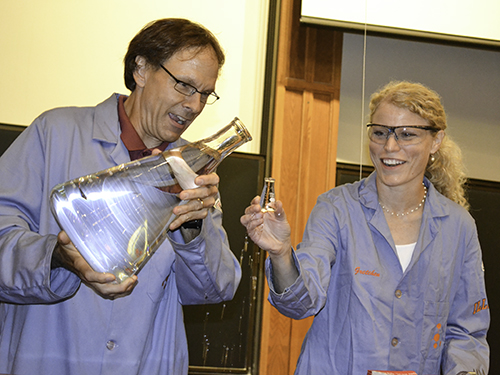
Left to right: Don Decoste and Gretchen Adams during the Chemistry Demo; Decoste's big beaker represents the professor with his/her wealth of knowledge...Adam's little beaker—the student.
Student coordinator Liz Gacek recalls the impact the chemistry demo had on her during Orientation:” When I was a freshman, the chemistry demo was what really blows your mind; things are exploding left and right, and it just really draws you in.”
Some of Decoste and Adams’ advice?
- Don’t waste precious hours between your two or three classes a day; all of a sudden, you’ll find that you’re way behind.
- Don’t be afraid to approach your instructors: introduce yourself to your professor early in the semester, so you won’t be afraid to approach him/her when you really need help later on. Other orbs of wisdom:
- Don’t forget to eat and sleep! While students might have considered these no-brainers, lack of time management (see #1 above), can result in a vicious chicken-and-egg cycle: staying up late studying, which leads to sleeping in late, which leads to missing breakfast, which leads to going to class hungry, etc.
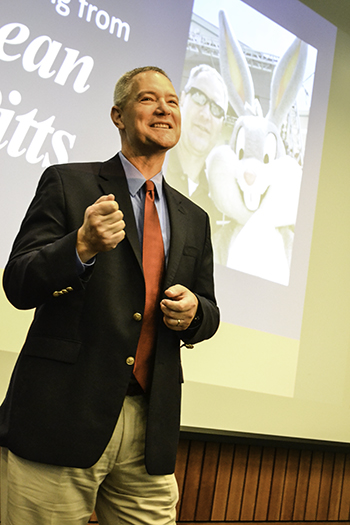
Dean Pitts gives the girls some sage advice during the introductory session. And yes, that's Pitts in the background with a very big bunny—an image the ladies somehow managed to ferret out, all in good fun.
Larson believes the practical advice about the difference between high school and college is much needed: “A lot of students have never had classes where the homework is posted online; if the student doesn’t look online, and they just wait for the professors to write it on the board, they will be behind from day one.”
Also stressed multiple times in multiple venues was campus resources freshmen could turn to for help: Engineering’s offices and study places and most of all—people. People like Dean Pitts, the WIE directors, and the WIE Orientation mentors.
Older female engineering students whom the freshmen could approach with questions, both during Orientation and beyond, were considered key to a freshman’s support system, and girls were encouraged early and often to take advantage of these mentors. To foster mentoring relationships, 49 female engineering students from the freshmen's own departments served as mentors, showing the girls the ropes; sharing their wisdom and expertise; and giving the girls a name, a face, and a number they could contact: someone who was—and in the future would be—just a text or a call away.
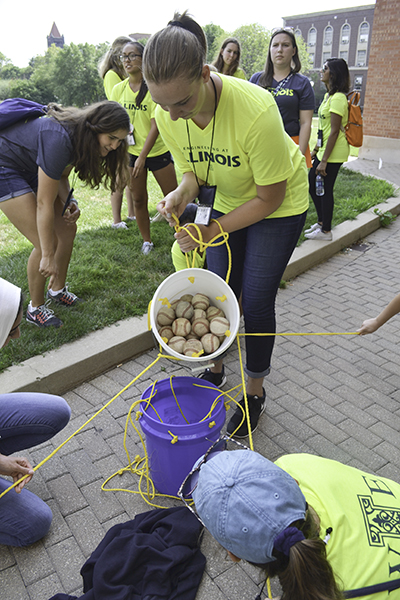
A team of freshmen do a teamwork activity by Grainger Library: they must dump the bucket of balls into another bucket using only the ropes to guide the bucket.
Ficht says the mentors she gained as a freshman were invaluable: “At Orientation, I met a lot of great mentors, and they helped me plan my schedule, and this is actually my first semester that I planned my schedule all on my own. So I’ve had upper classmen looking at my schedule and tell me what classes are good to take together and getting advice from that perspective. And it’s also great because you get to meet the advisers earlier.”
Having so many mentors also helped keep group sizes down—creating more intimate small groups. The ratio was 1 mentor to 5 or 6 girls, “so they really get some personal time as opposed to being lost in a big group of 20 or 30 of them,” Ficht explains.
For undeclared freshmen, students who had themselves been undeclared freshmen mentored them. For example, Kate McDuff, a junior in Mechanical Engineering who mentored several undeclared majors, explains the importance of having so many mentors involved. “The really cool thing about when I came [to WIE Orientation], we really got the opportunity to not just talk to one mentor or three mentors, but we kind of did a round robin where you could ask anybody questions about anything. And that was awesome being undeclared, since you were interested in so many different fields of engineering. So we got to have our questions answered from more of a personal level from each individual girl. Everybody was just so helpful and welcoming, it just really made me feel like no matter which field I chose, I would always have people there to help me out, and do homework with me, and talk me through everything.”
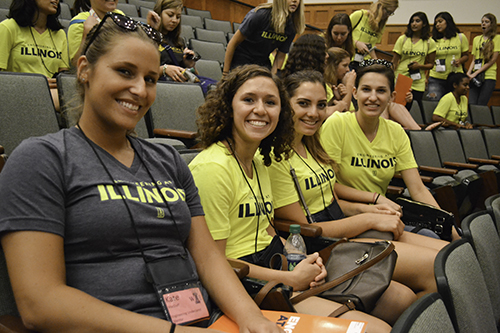
Left to right: Kate McDuff and three Engineering undeclared freshmen she mentored during WIE Orientation: Abigail Iouro,Celin Sipahi, and Alexander Fanning.
The mentors, a great asset and resource for Orientation, wanted to give back some of what they received when they were new students, and to ensure that these “newbies” in their own discipline were successful. Two mentors explained why they got involved:
According to McDuff: “When I was an incoming freshman, I attended this camp and it was one of the things that acclimated me to campus, as well as provided me with an opportunity to make some new friends and feel more comfortable coming in as a female engineer. So I just wanted to return the favor. Plus, I love helping younger people whenever they have questions or don’t feel comfortable on campus. I’m here to make their lives as easy as possible.”
Another mentor, Hannah Parker, reflects: “I’ve been really involved in the CS department and talking to students outside the program who are interested in getting into engineering, and I think women are especially an untapped group of that. So I think it’s awesome that all these girls are so interested in coming early and trying to learn, and if I can make that experience any easier, I totally want to help.”
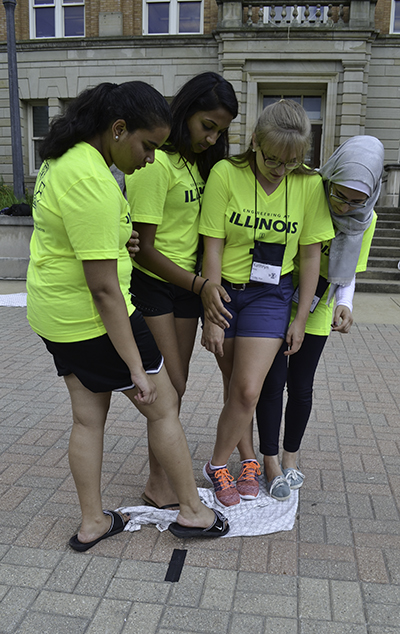
Engineering freshmen do an activity on the Engineering Building's south portico.
The coordinators, all seniors, took on the task of organizing and running the Orientation because of their positive experiences at Orientation as freshmen. For Ficht, it resulted in a roomie.
“Freshmen year at Orientation, I met Liz, and now we are roommates and best friends. So that was great.”
She also says it also gave her a leg up, helped her feel comfortable…and allowed the freshman girls to one up the guys.
“And I remember all the guys coming to campus after us, and they were all jealous because we already all knew each other by name. And we’ve already met a lot of the faculty. And the boys are kind of just there. It really gives us a leg up on feeling comfortable and making you love your home.”
Liz Gacek recalls that it was the relationships she developed that made orientation special: “The support that you leave camp with, just friends, and Angie, and Sue Larson; it really makes you feel encouraged that you’re going to do great in the College and do great in Engineering, and you just want to keep going further. So that would be a highlight for me.”
For Lara Flasch, it was relationships built during the scavenger hunt. “I think the scavenger hunt is just a fun bonding time with the group and exploring the campus like you would on a normal day.” And Flasch shares about another new technology they added to make it even more fun, “And we have a customized snapchat filter set up for the day during the scavenger hunt.”
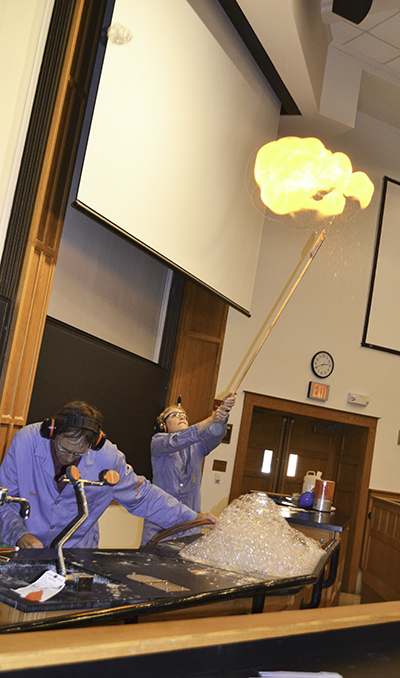
Left to right: Don DeCoste and Gretchen Adams create one of their louder "explosions" during the Chemsitry Demo.
With all the time, energy, and money spent on Orientation, was it a success? The freshman who attended seem to think so.
Abigail Iurio, an undeclared engineering freshman, explains why she attended Orientation and how she benefitted:
“I know the stereotype about engineers is that women are not as well represented, and so to be able to meet other people in engineering and to get to know campus a little better, I thought it sounded appealing to get to know more girls in my classes and get to know more about the resources available on campus”
Orientation’s activities helped Iurio adjust to the large-scale campus. “Just walking around has gotten me acclimated to campus,” Iouro states. “Like I didn’t know where this building was before. And to meet our advisors, even though I already met her, but to figure out where the advising offices are, and figuring out the different places I can go when I need help, like the Grainger Library.”
Another undeclared, Selin Siphi, describes her reasons for attending: “I thought it would help me be better acclimated to campus, and it’s really interesting to meet all these women and hear their career paths and what they are interested in. And it’s nice to see that there are people like me who are undeclared in engineering and it makes the transition of going into college a lot easier.”
When asked what she’s learned that she’ll apply right away, Siphi reflects, “They’ve given a bunch of great advice, the mentors are being really helpful. I guess the main thing I’ve learned is to be really involved in campus, because that’s really how you can meet people and get out of your own shell. Definitely time management is a big thing that I hear.”
Alexandra Fanning, also an undeclared engineering student, had similar motivations for attending WIE.
“It’s one thing to hear what it is to be a woman in engineering, but I kind of wanted to get a better idea of what it meant to be in a group of women like that,” Fanning explains. “And also to learn as much as I could about what I’m getting myself into, I guess. There are a lot of awesome girls and mentors.”
Also looking for a tight-knit group of women engineers was Dinaz Kureishy, a Civil and Environmental Engineering (CEE) freshman who attended CEE’s GAMES camp last year. Her experience during GAMES helped her choose Illinois over 17 other schools. Kureishy explains:
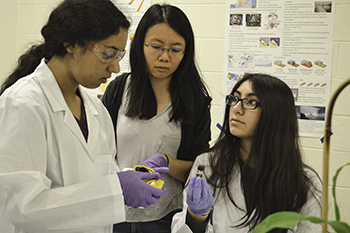
Right: Dinaz Kureishy participates in an activity during the CEE GAMES camp last summer.
“GAMES camp really moved me. I met so many great people there, I felt at home at Illinois, even though I’m from New Jersey. I had such a great week. I learned so much, and I found that everyone over here was really helpful, and if I had any questions about what I wanted to do in college or in my future, they would always be here to help and guide me in the right direction.”
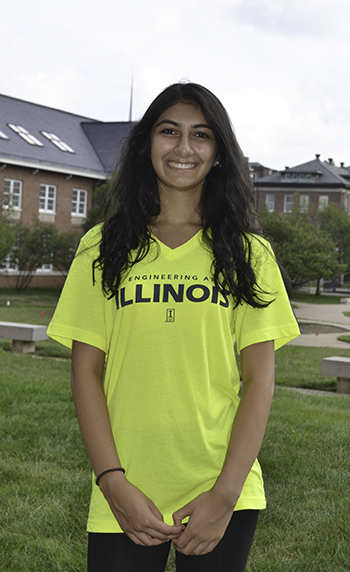
Engineering freshman Dinaz Kureishy.
And it was because of Illinois’ support system for women, that Kureishy attended WIE Orientation. “Last year at GAMES,” she elaborates, “it was obviously for women engineers, and I feel like at Illinois, they have a very strong support system for women in engineering. So when I got the email, it was a no brainer. I had to sign up for it. And I had actually met Angie Wolters last year at GAMES as well, and I had met her again at the admitted student’s day. When I heard she was running it and was involved with this, I was like, ‘I have to come.’”
Story and photos by Elizabeth Innes, Communications Specialist, I-STEM Education Initiative
More: Engineering, WIE, Women in STEM, 2016
For additional I-STEM articles about WIE Camp, see:
- Cindy and Stephanie Richartz—Keeping It in the Illinois Engineering Family
- WIE Orientation 2015 Shows Female Engineering Freshmen the Ropes
- WIE Camp 2014: Creating Community for Female Engineering Students
- Women in Engineering Camp Facilitates Relationship Building
- From WIE Camp to Seniors: Two Future Engineers Credit Illinois' Community of Support
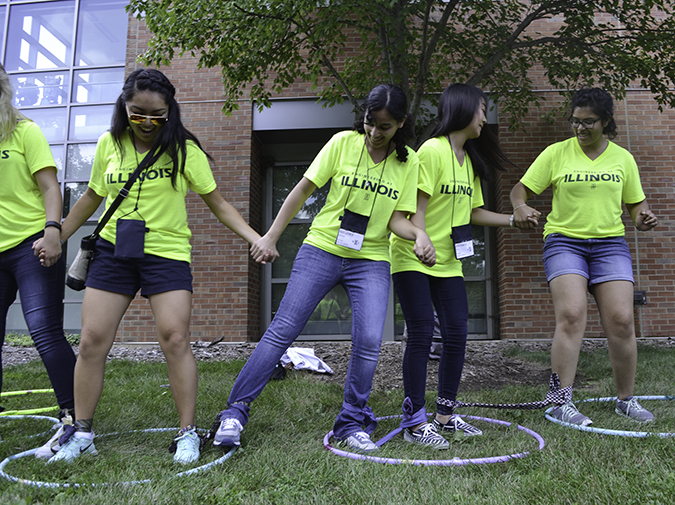
WIE Orientation freshman do a teamwork activity: they must traverse the hulahoop obstacle course...with their feet tied to their teammmates' feet.
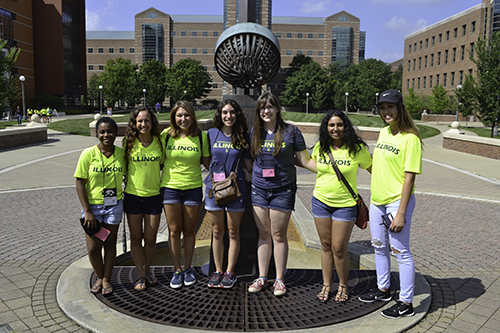
Some incoming freshmen and their mentors on Bardeen Quad during the scavenger hunt.
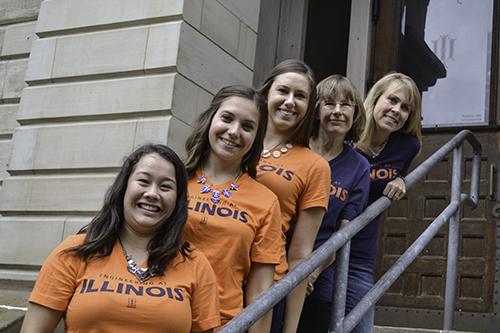
Left to right: the WIE Orientation 2016 planning committee: Rebecca Ficht, Liz Gazek, Lara Flasch, Sue Larson, and Angie Wolters.
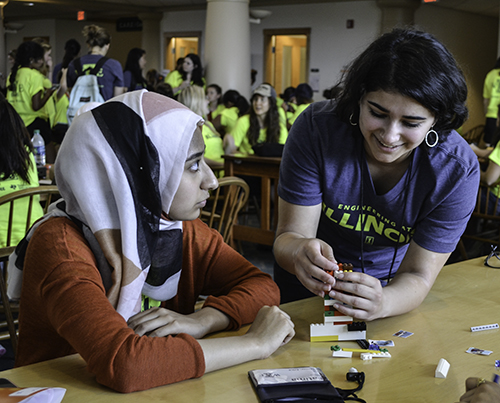
A mentor (right) works with a freshman during the Lego Build at CARE.
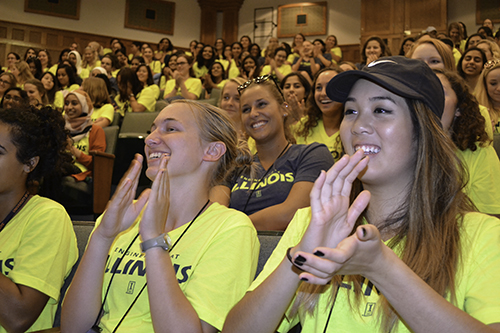
WIE Orientation participants appreciate Decoste and Adams' antics.
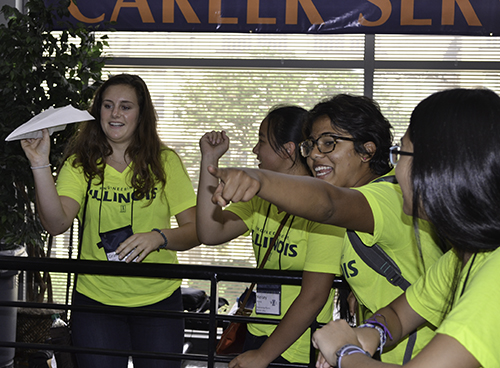
A team of freshmen fly the glider they designed just outside of Engineering Career Services during one of the activities during the scavenger hunt.
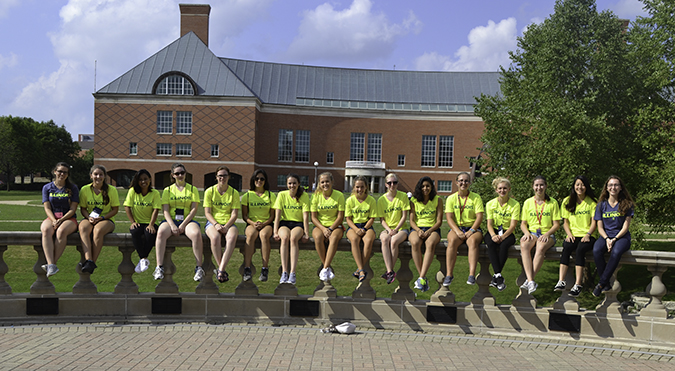
A couple of teams take a break on the south portico of the Engineering Building.













.jpg)
















